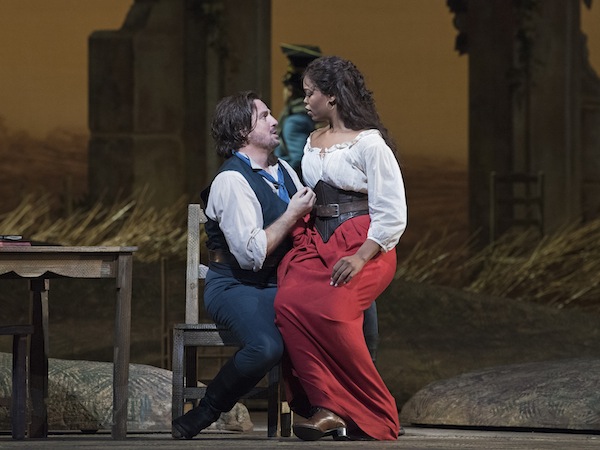Superb cast rouses Met’s dormant “Elixir”

Matthew Polenzani and Pretty Yende in Donizetti’s “L’Elisir d’Amore” at the Metropolitan Opera. Photo: Karen Almond
It might be tempting to write off Donizetti’s L’Elisir d’Amore as one astonishing tenor aria and two hours of entertaining fluff. It’s more than that, of course, even if its subject feels superficially flimsy. For this romantic comedy of errors to work its magic, the three principals have to be willing to give themselves over entirely to the silliness of the scenario, letting the absurdity of Nemorino and Adina’s testy courtship and the outsize personality of Dr. Dulcamara shine through without being overly self-conscious.
The Metropolitan Opera’s latest revival of the opera manages to find most of that charm, though in Tuesday night’s season premiere the cast didn’t find its rhythm until well into the first act.
Early ensemble problems and sleepy direction from the pit made for a slow start, and Pretty Yende, this run’s Adina, sounded as though she might be ill. She struggled to produce much sound in her lower register, her high notes were squeezed, and in the first scene she was inaccurate and often seemed out of breath. She played it safe initially, putting little energy into her vocal characterization, even as she brought a youthful spark to her dramatic portrayal. She warmed up beautifully as the opera progressed, grounding herself in her superb technique, and eventually finding the citric freshness and rippling coloratura that make her such a thrill to hear.
Things began to turn around with the brilliant appearance of Ildebrando D’Arcangelo as Dulcamara. A real charlatan in every sense, his unscrupulous portrayal of the sham doctor wasn’t so much a dazzling miracle worker as a smooth operator, more Harold Hill than Wizard of Oz. D’Arcangelo has an ideal voice for a comic role like this one, a firm bass with a rich grain and full body. His closing number, “Ei correge ogni difetto,” the catalogue of his potion’s limitless applications, was delivered with delicious sleaze.
Matthew Polenzani carried much of Tuesday’s performance as Nemorino—not for a moment did he break from his endearing portrayal of the gullible mark, nor did his clear tenor show the slightest hint of wear. His comic drunken antics delighted, but the earnestness of his affections was disarming, too. His voice rang brilliantly all night, nowhere better than in his splendid rendition of the touchstone aria “Una furtiva lagrima.” He showed exemplary dynamic control, exploring the full range of the aria: his creamy, caramel tone swelling to full-throated joy before tapering back down to a misty, mixed-voice pianissimo.
Davide Luciano made a fine company debut as the puffed-up sergeant Belcore, showing a tone both rich and flexible and an appropriate swagger. Sadly, however, he made the common mistake of wanting to explore the dark side of the character, but being unwilling to completely sacrifice the comedy. The result was half-hearted little expressions of odiousness like the grabbing of a lady’s wrist, insufficient to make much of a statement, yet enough to leave a creepy memory when the audience is asked to accept the character’s cheerful role in the uncomplicated resolution.
Ashley Emerson was initially difficult to hear as Giannetta, but she found her lively voice and tart energy in Act II, as she led the ladies of the town in their mass courtship of Nemorino.
Domingo Hindoyan’s debut in the pit was touch-and-go. He found moments of sunny energy, but those were largely exceptions. An unconvincing Overture was punctuated by wimpy sforzandi, and he was hopeless in trying to follow the stop-and-start patter of Dulcamara’s first appearance. At the top of the second act, the onstage band seemed to be dictating the tempo to the pit.
Bartlett Sher’s staging gives the actors places to stand but does little else. Its painted flats and muted rustic hues, just over five years old, already look faded, and the entire mise-en-scene is wearyingly drab as a result. It also features, in between the two scenes of the first act, that scourge of the operagoing public, a “Brief Pause,” which has thankfully become rarer in more recent Met productions. The second-act scene transition, consisting of a number of costumed stagehands mysteriously pulling tufts of grass into place, was neither ingenious nor particularly logical. Still, it beats sitting quietly in the dark for ten minutes, waiting for a modest set change.
L’Elisir d’Amore runs through February 17 at the Metropolitan Opera. metopera.org


